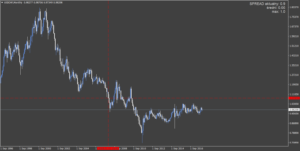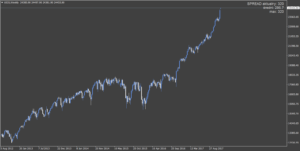Look for opportunities, not holes, or why it is not worth catching falling knives
By investing, or purely speculating on Forex, or on any financial market, you surely met with the saying "Not the paws of falling knives". I am also convinced that in your trader's career you have opened up a position guided by the course of reasoning in the style of "It's cheap now, you have to buy" and/ or "The rate is so low that it will definitely bounce back". And how? Managed to? Once in a few tries, probably yes. Forex bargains happen, but why more often than not?
"Buy cheap, sell high"
Cheap, I mean how much? This is the main problem. It's difficult to define how much of it "cheaply". Is this a sufficient signal to open a position? $ 1000 per ounce of gold is a lot or a little? If an instrument is the cheapest ever, does that mean it can't be even cheaper in the future? Analysis done on the knee, reacting under the influence of emotions and often even under the influence of third party opinions. This creates chaos in our trading methodology and ruins the foundations of the system we use. Self-discipline and the developed rules disappear in an instant because we can see "Occasion".
READ ALSO: How to deal with a bad run in trading?
One of my friends in 2008 claimed that USD / CHF, after the 7 years of declinewill not go below the 1.10 level. Probably open position remains to this day. Of course, if it was enough capital :-).
Why doesn't the "buy cheap, sell high" rule not work?
It's very simple, forex deals are frequent. However, we will always have a problem with precisely determining when something is cheap, and catching a hole (which is suggested by this rule) is extremely difficult. With this approach, when the directional movement is gaining momentum and we have not managed to open a position at the very bottom, we are missing the opportunity to take a position. The trend continues, and we blame ourselves for not hitting the trough and abandon the entire setup, watching the course climb to the sky for another month. Because we thought it would be "cheaper" or that it was still there "too expensive".
We have to accept it - we do not decide about trends. We have no influence on them. You have to adapt.
Word "expensive", Czy "cheaply" it is only our subjective evaluation of the current course, where very often "cheaply”For us is a synonym of a minimum price. So it is not about always hitting the hole (do not confuse the hole with a local hole, ie a correction). It is also not important whether we still hit "cheaply"or in "expensive" with our opening position.
Without influencing the course design, our job should be determining the direction of the trend, and not a precise determination of the hole (assuming that our strategy is the so-called follower trend). Trying to catch "falling knives" we balance on the edge, reducing the probability of achieving a positive result in the long term. Don't kid yourself - start looking for good trading opportunities, not lows.






















![Forex Club – Tax 9 – Settle tax on a foreign broker [Download the Application] Forex Club - Tax 9](https://forexclub.pl/wp-content/uploads/2024/02/Forex-Club-Podatek-9-184x120.jpg?v=1709046278)
![Trading View platform – solutions tailored to the needs of traders [Review] trading view review](https://forexclub.pl/wp-content/uploads/2024/03/trading-view-recenzja-184x120.jpg?v=1709558918)
![How to connect your FP Markets account to the Trading View platform [Guide] fp markets trading view](https://forexclub.pl/wp-content/uploads/2024/02/fp-markets-trading-view-184x120.jpg?v=1708677291)
![CRB index – one of the popular commodity market benchmarks [Guide] crb index](https://forexclub.pl/wp-content/uploads/2024/05/indeks-crb-184x120.jpg?v=1715055656)
![How to invest in ChatGPT and AI? Stocks and ETFs [Guide] how to invest in chatgpt and artificial intelligence](https://forexclub.pl/wp-content/uploads/2023/02/jak-inwestowac-w-chatgpt-i-sztuczna-inteligencje-184x120.jpg?v=1676364263)





![Izabela Górecka – “Success on the market depends not only on knowledge, but also on emotional stability” [Interview] Izabela Górecka - interview](https://forexclub.pl/wp-content/uploads/2024/04/Izabela-Gorecka-wywiad-184x120.jpg?v=1713870578)
![WeWork – the anatomy of the collapse of a company valued at $47 billion [WeWork, part II] wework bankruptcy story](https://forexclub.pl/wp-content/uploads/2024/04/wework-bankructwo-historia-184x120.jpg?v=1711729561)
![Adam Neumann – the man who screwed up Softbank [WeWork, part AND] adam neumann wework](https://forexclub.pl/wp-content/uploads/2024/04/adam-neumann-wework-184x120.jpg?v=1711728724)


![The most common mistakes of a beginner trader - Mr Yogi [VIDEO] Scalping - The most common mistakes of a beginner trader - VIDEO](https://forexclub.pl/wp-content/uploads/2024/03/Scalping-Najczestsze-bledy-poczatkujacego-tradera-VIDEO-184x120.jpg?v=1711601376)
![Learning patience: No position is also a position - Mr Yogi [VIDEO] Scalping - Learning patience - No position is also a position - VIDEO](https://forexclub.pl/wp-content/uploads/2024/03/Scalping-Nauka-cierpliwosci-Brak-pozycji-to-tez-pozycja-VIDEO-184x120.jpg?v=1710999249)
![When to exit a position and how to minimize losses - Mr Yogi [VIDEO] Scalping - When to exit a position and how to minimize losses - VIDEO](https://forexclub.pl/wp-content/uploads/2024/03/Scalping-Kiedy-wyjsc-z-pozycji-i-jak-minimalizowac-straty-VIDEO-184x120.jpg?v=1710336731)






![How to look for investment opportunities? Invites Bartosz Szyma [Closer to the Stock Exchange] investment opportunities bartosz szyma](https://forexclub.pl/wp-content/uploads/2023/11/okazje-inwestycyjne-bartosz-szyma-300x200.png)














Leave a Response